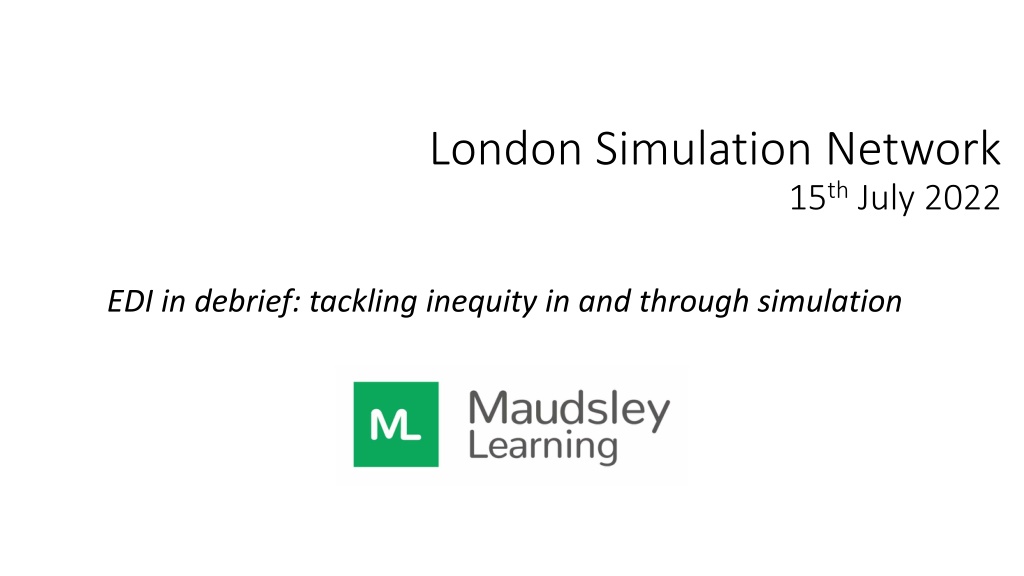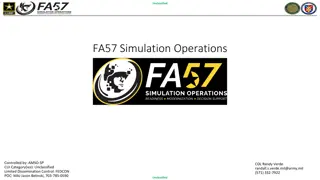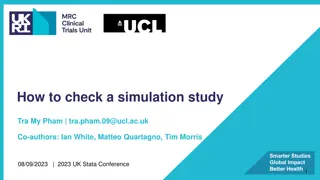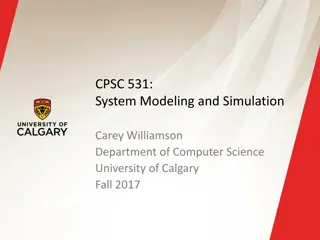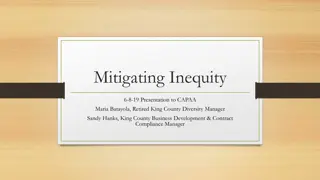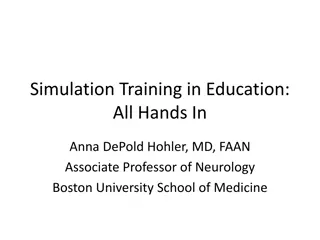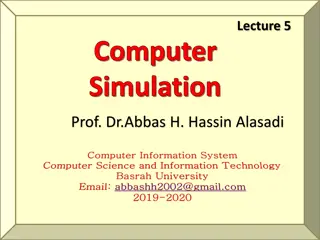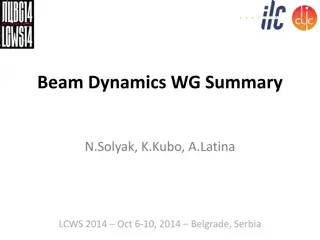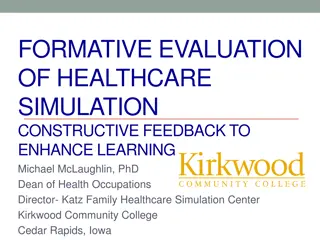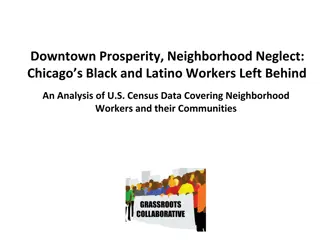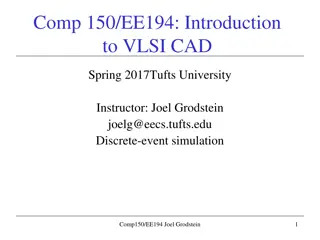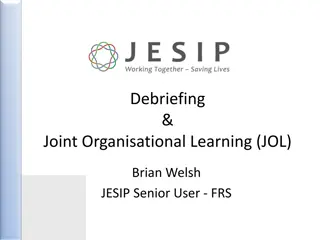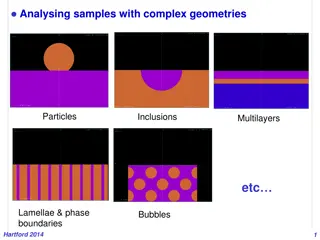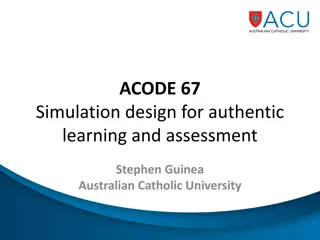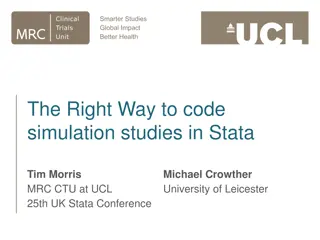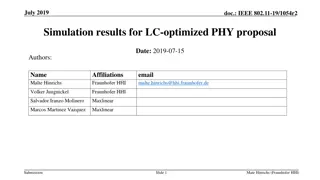Addressing Inequity in Simulation Debriefs: London Network Event Insights
Explore the London Simulation Network event debrief focusing on Equity, Diversity, and Inclusion (EDI). Sessions covered the scale of inequity issues, specialist topics, and discussions on discrimination in healthcare settings. The event emphasized creating a safe and inclusive space for participants to engage in meaningful dialogue and learning around tackling inequity both within and through simulation practices.
Download Presentation

Please find below an Image/Link to download the presentation.
The content on the website is provided AS IS for your information and personal use only. It may not be sold, licensed, or shared on other websites without obtaining consent from the author. Download presentation by click this link. If you encounter any issues during the download, it is possible that the publisher has removed the file from their server.
E N D
Presentation Transcript
London Simulation Network 15thJuly 2022 EDI in debrief: tackling inequity in and through simulation
Session Schedule Orientation Introductions & Mastermind EDI in debrief Before During In action After - don t forget Question and answer session 5 minutes 5 minutes 5 minutes 20 minutes 10 minutes 15 minutes
Housekeeping Environment Check your background (no blurring) People living with you may need to know you are in a training session please protect this space as you would do in a training centre Comfort Toilets, fire escape Feel free to bring a drink Psychological safety Session recording consent Confidentiality
EDI: scale of the problem Do you wish to put your knowledge on this to the ultimate test? B: Yes A: Yes C: Yes D: Yes
Maudsley Mastermind: specialist topic EDI 1. Relative likelihood of white NHS applicants being appointed from shortlisting compared to BME in 2021? B: 1.61 A: 1.1 C: 2.3 D: 1.45 2. Percentage of white staff experiencing discrimination from colleagues in NHS in 2021? B: 8.3 A: 6.2 C: 2.9 D: 4.5 3. Percentage of BME staff experiencing discrimination from colleagues in NHS in 2021? B: 16.7 A: 12.4 C: 8.8 D: 7.5 4. Relative likelihood od white staff getting access to non-mandatory training and CPD compared to BME? B: 1.09 A: 1.14 C: 2.3 D: 1.73
Maudsley Mastermind: specialist topic EDI 1. than white group, in the second wave? Adjusting for geographical, socio-economic and pre-existing health factors, which group was at higher risk of COVID-19 mortality B:. Indian A: Black African C: Pakistani D: Chinese 2. identity? Percentage of LGBTQ+ individuals who had a negative experience when accessing public health services because of their gender B: 28.1% A: 14% C: 42% D: 38% 3. white counterparts? How much more likely was a person of mixed ethnicity likely to be restrained in mental health services in 2019, compared to their B: 1.4 A: 1.7 C: 2.0 D: 3.0
The thought of bringing up EDI during a debrief makes me feel.... Because....
Stage 1: Preparedness The faculty Make up SLaM are committed to tackling inequality, eliminating discrimination and harassment, promoting equality of opportunity for all and fostering good relations. Current knowledge The psychological space https://www.slam.nhs.uk/about-us/equality/public-sector-equality-duty/ Icebreaker type Ground rules Statement Role modelling, avoiding re-enactment Timing
Sneak preview of reading list NHS Race and Health Observatory https://www.nhsrho.org/ Vara S., Dahlen B., et al. (2021), Recommendations and Guidelines for the Use of Simulation to Address Structural Racism and Implicit Bias, Simulation in Healthcare 1;16(4):275-284.doi 10.1097/SIH.0000000000000591. PMID: 34398114. Reni E-L, (2017) Why I m No Longer Talking to White People About Race, Bloombsbury Circus Braincast, About Race: ethnic inequalities in mental health, maudsleylearning.com/webinars-podcasts/braincast-webinar/about-race- ethnic-inequalities-in-mental-health NHS Workforce Race Equality Standard 2021 data analysis report for NHS trusts (2022) https://www.england.nhs.uk/wp- content/uploads/2022/04/Workforce-Race-Equality-Standard-report-2021- .pdf
Stage 2: Raise The direct approach Perspective taking I noticed that.... I wonder what... Watchful waiting of a carefully constructed scenario What might the patient/carer be thinking or feeling? De- personalising, owning things as a group The side door (start with the easier isms ) The carefully loaded question Do we think things would have been different if.... were there any protected characteristics which may have...
Stage 3A: Response - participants TRYING TO USE LOGIC AND VERBAL REASON TO JUSTIFY SOMETHING UNACCEPTABLE TRIES OVERLY HARD IN OPPOSITE DIRECTION SILENCE Denying lived experience FOCUSED ONLY ON THE COGNITIVE ASPECTS, AVOIDS EMOTIONS I do not see colour DISPUTING THE EXISTANCE OF A PROBLEM OVERLY CRITICAL OF SOMEONE/SOMET HING ELSE UNRELATED DEFLECTING THE CONVERSATION, AVOIDING THE MAIN ISSUE Dodging specific words by using others e.g. inner city youth Reframing as being to do with economy ACCUSES SOMEONE ELSE OF WHAT THEY ARE DEMONSTRATING SHOUTING, INTERRUPTING & NOT LISTENING COMFORT EATING
Stage 3A: Response defense mechanisms Unconscious psychological strategies activated within a person, in difficult emotional and/or cognitive situations, in order to help resolve the inner conflict They distort reality to defend us against unacceptable feelings or impulses, and maintain our one schemas about ourselves ....not all defense mechanisms are considered equal
Stage 3A: Response - participants TRYING TO USE LOGIC AND VERBAL REASON TO JUSTIFY SOMETHING UNACCEPTABLE SILENCE RATIONALISATION DENIAL TRIES OVERLY HARD FOCUSED ONLY ON THE COGNITIVE ASPECTS, AVOIDS EMOTIONS DISPUTING THE EXISTANCE OF A PROBLEM INTELLECTUAL ISATION REACTION FORMATION REPRESSION OVERLY CRITICAL OF SOMEONE/SOMET HING ELSE UNRELATED DEFLECTING THE CONVERSATION PROJECTION SHOUTING & NOT LISTENING ACCUSES SOMEONE ELSE OF WHAT THEY ARE DEMONSTRATING REGRESSION DISPLACEMENT COMFORT EATING
Stage 3A: Response - FACILITATORS TRYING TO USE LOGIC AND VERBAL REASON TO JUSTIFY SOMETHING UNACCEPTABLE SILENCE RATIONALISATION DENIAL TRIES OVERLY HARD FOCUSED ONLY ON THE COGNITIVE ASPECTS, AVOIDS EMOTIONS DISPUTING THE EXISTANCE OF A PROBLEM INTELLECTUAL ISATION REACTION FORMATION REPRESSION OVERLY CRITICAL OF SOMEONE/SOMET HING ELSE UNRELATED DEFLECTING THE CONVERSATION PROJECTION SHOUTING & NOT LISTENING ACCUSES SOMEONE ELSE OF WHAT THEY ARE DEMONSTRATING REGRESSION DISPLACEMENT COMFORT EATING
Ways Redirect back, refocusing on experiences and not generalities Name the problem Name the defense mechanism Facilitate other group members to counteract Ouch Clarifications e.g. what do you mean by inner city youths ? If you were someone of colour, who would you experience hearing someone say they don t see colour?
